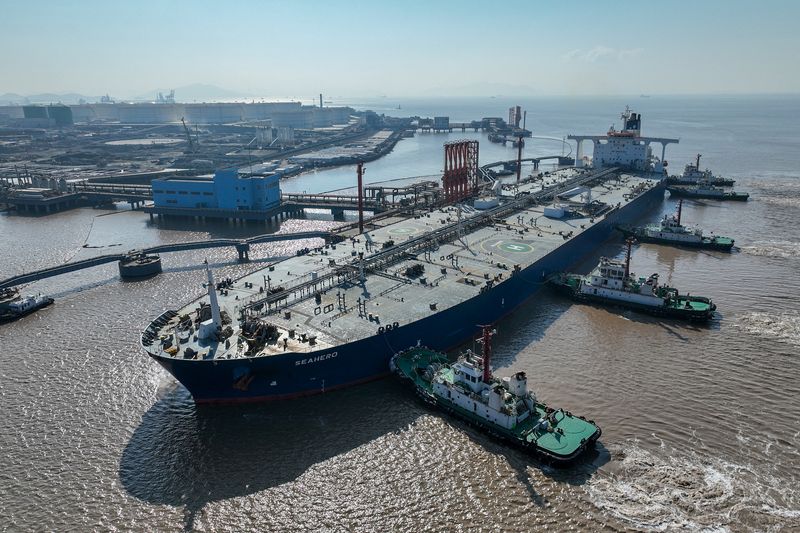By Stephanie Kelly
NEW YORK (Reuters) -Oil prices edged lower on Wednesday, as investors took profits following earlier gains on tighter U.S. crude supplies and China's pledge to reinvigorate its economic growth.
Brent futures dipped 17 cents at $79.46 a barrel, while U.S. West Texas Intermediate (WTI) crude dropped 40 cents at $75.35 a barrel.
Prices pared gains late in the session after both contracts had risen by over $1 a barrel. Market participants took advantage of the higher prices and took profits, said Phil Flynn, an analyst at Price Futures Group.
Strength in the U.S. dollar index also weighed on prices. A stronger greenback makes crude more expensive for investors holding other currencies.
Limiting losses, U.S. crude inventories fell by 708,000 barrels in the last week to 457.4 million barrels, compared with analysts' expectations in a Reuters poll for a drop of 2.4 million barrels, Energy Information Administration data showed on Wednesday. [EIA/S]
The data showed inventories in the Strategic Petroleum Reserve climbed for the first time since January 2021, as the U.S. tries to refill the reserve following last year's record drawdown.
"It's an end of an era," Flynn said. "We're reminded the SPR releases have come to an end, and the market is going to be on much more solid footing."
In a measure that could boost oil demand, China's top economic planner pledged on Tuesday to roll out policies to "restore and expand" consumption in the world's second-largest economy.
U.S. data on Tuesday showing retail sales rose less than expected in June boosted views that the Federal Reserve will stop raising interest rates. Higher rates increase borrowing costs and can slow economic growth and reduce oil demand.
In another positive sign, European Central Bank governing council member Klaas Knot on Tuesday suggested that rate hikes beyond the ECB's meeting next week were "by no means a certainty."

"Traders have started to become a lot more optimistic as inflation eases off. ... Any improvement in the inflation data also means an improvement in oil demand," said Naeem Aslam of Zaye Capital Markets.
Russia is set to reduce its oil exports by 2.1 million metric tons in the third quarter, in line with planned voluntary export cuts of 500,000 barrels per day in August, according to the country's energy ministry.